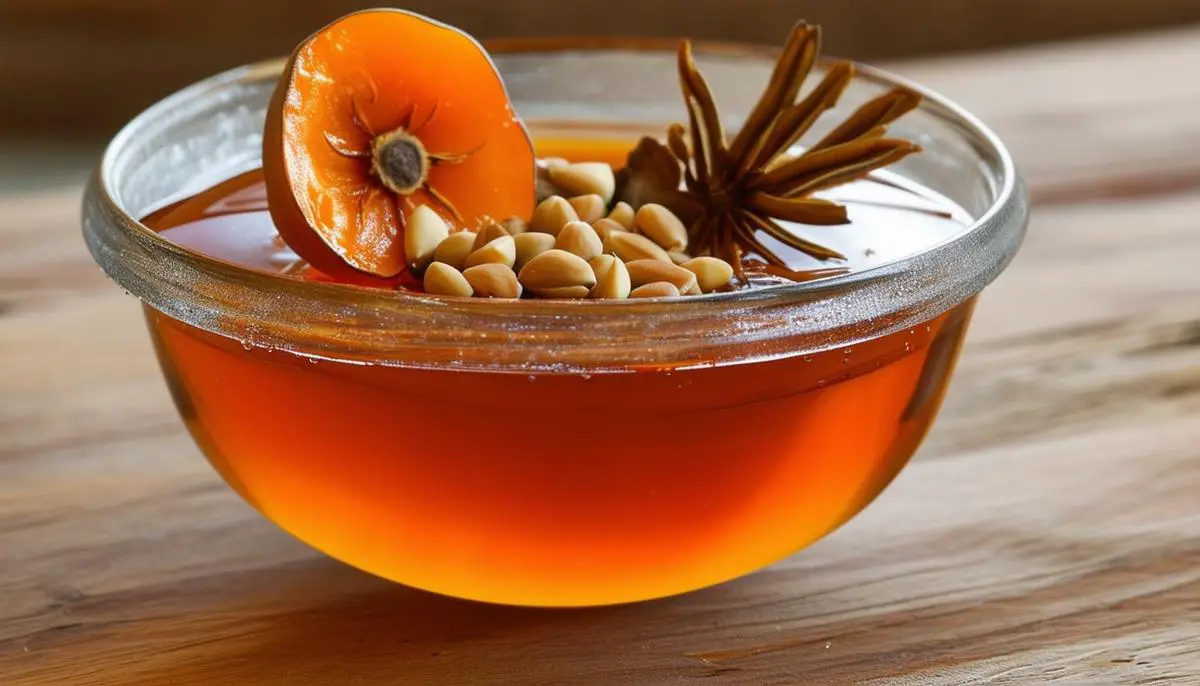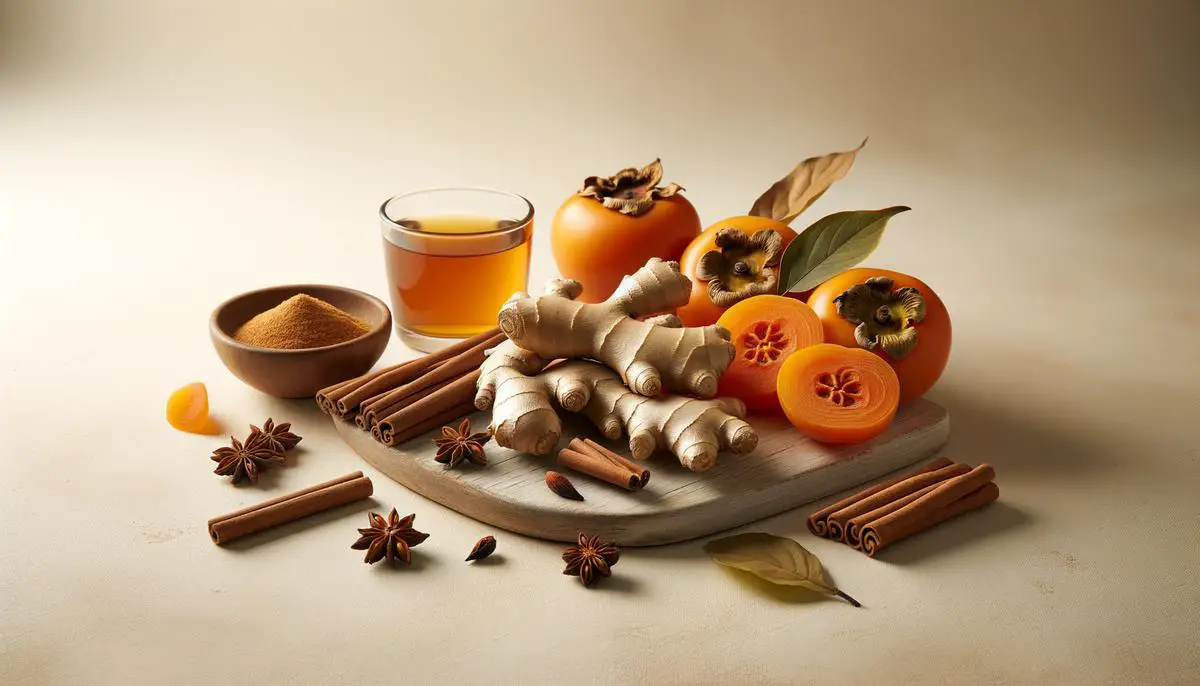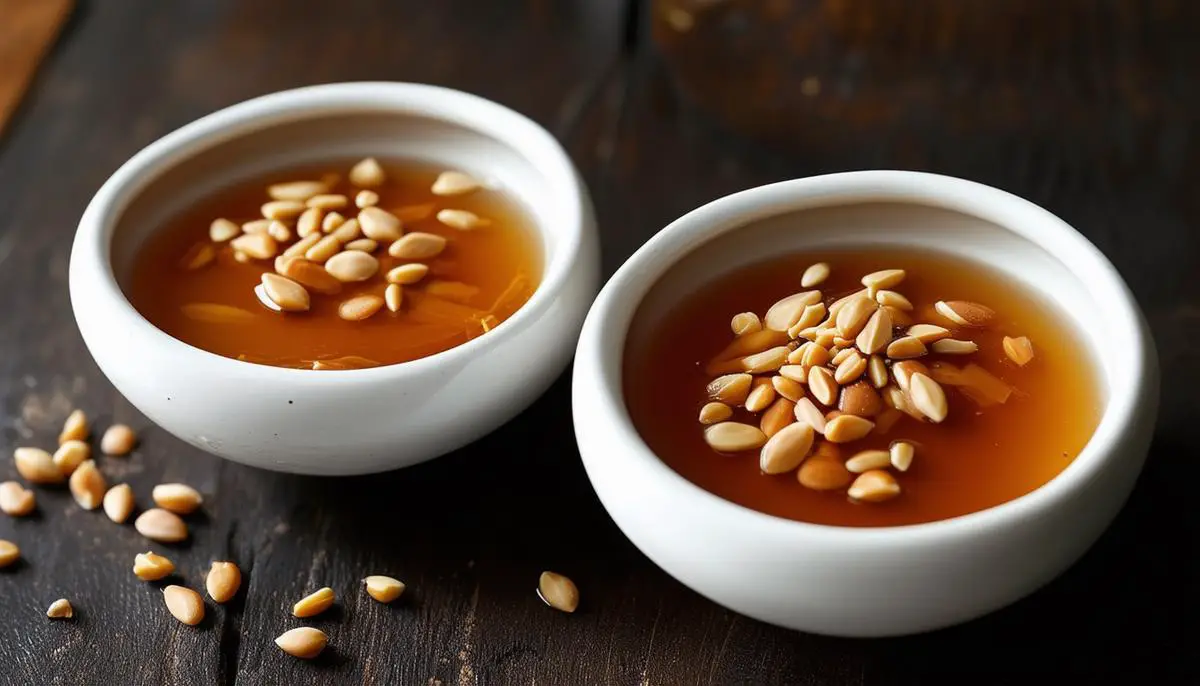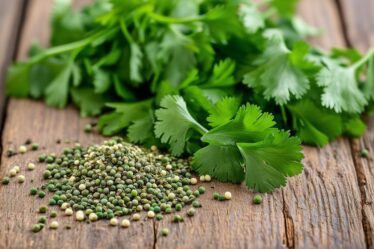
Background and Cultural Significance
Sujeonggwa, a distinctively Korean concoction, traces its roots to the Joseon Dynasty circa 1765. This punch-like drink, traditionally enjoyed during festive holidays such as the Lunar New Year and Chuseok (Korean Thanksgiving Day), embodies the quintessence of Korean culinary heritage. Served at the end of lavish meals, especially at Korean BBQ establishments, it delights the senses and aids digestion, thanks to its ginger component known for its digestive benefits.
The constitution of Sujeonggwa is enchanting. Comprising cinnamon sticks, fresh ginger, and dried persimmons, each element serves a purpose beyond flavor enhancement. Cinnamon imbues the drink with a warm, spicy note, while ginger imparts a sharp zest, together creating a harmonious blend that is both soothing and invigorating. The dried persimmons elevate the drink's sweetness and introduce a subtle fruity undertone—transforming the punch into a symphony of flavors.
Sujeonggwa aligns with the persimmon season in late fall, although modern agricultural practices have mitigated this seasonal limitation. I remember the first time my mother prepared Sujeonggwa—watching her expertly slice ginger and rinse cinnamon sticks, the heady aroma filling our kitchen. It was a ritual as much as it was a recipe, grounding the transient nature of seasonal fruits in a timeless beverage.
This beverage is not merely about taste; it is a tradition anchored in health. Both ginger and cinnamon are celebrated for their anti-microbial properties. In the chilly winter months, a sip of Sujeonggwa feels almost medicinal—a gentle nudge against the onslaught of colds. Koreans have long revered ginger for its digestive benefits, explaining why this drink closes the meal at many Korean BBQ feasts.
I recall vividly each Korean New Year's Day when my family would gather, and my mom would insist on serving Sujeonggwa. The deep amber hue of the drink contrasted sharply against the festive backdrop, but it was the aroma—a mixture of deep, rich cinnamon and sharp ginger—that signaled the real start of the celebrations. There was a palpable sense of tradition, of continuity that brewed along with the punch.
Sujeonggwa encapsulates the beauty of Korean cuisine—profoundly simple yet deeply significant. The synergy between its ingredients not only crafts a delightful and healthful beverage but also weaves a tale that has been told and retold through generations, one steeped in warmth, heritage, and holistic wellness.
Key Ingredients and Their Benefits
Within the artful concoction of Sujeonggwa, each ingredient plays a vital role, not only in terms of flavor but also in contributing to the overall health benefits of the drink.
Ginger, at the forefront, imparts its distinct, sharp zest. When fresh ginger is peeled and sliced, it releases pungent oils that are instrumental in crafting the drink's characteristic heat. Appreciated for its potent flavor and celebrated for its anti-inflammatory and digestive properties, ginger makes Sujeonggwa an excellent digestive aid, especially after robust meals. In traditional Korean medicine, ginger has been used to alleviate cold symptoms, aligning with the drink's reputation as a winter tonic.
Cinnamon sticks provide the underlying warmth and spice. These sticks, when simmered, infuse the water with aromatic compounds that deepen the flavor profile. Cinnamon is known for its anti-inflammatory and antioxidant properties, enhancing the drink's appeal as a health-conscious choice. The use of good-quality cinnamon, such as Ceylon, can elevate the final product, as its subtle, delicate flavors meld seamlessly with ginger.
Dried persimmons, added towards the end of the brewing process, introduce a gentle sweetness and a layer of fruity complexity that rounds out the spice of the ginger and cinnamon. Additionally, dried persimmons contribute a wonderful textural element when rehydrated in the punch, offering a contrast to the liquid base. Rich in vitamins and antioxidants, they further add to the drink's healthful profile.
Sugar, whether white or brown, is essential in balancing the strong flavors of ginger and cinnamon, lending sweetness and a hint of depth, especially when using varieties like turbinado or raw sugar. The amount can be adjusted to taste, but it is crucial in melding all the flavors together.
Optional ingredients such as pine nuts can be used for garnish. These nuts add a delightful crunch and a touch of mild, buttery flavor that contrasts with the liquid's warmth. Dried jujube is another optional addition that introduces a slightly different sweet note and chewy texture, enhancing the complexity of the drink.
In the creation of Sujeonggwa, the interplay between these ingredients results in a flavorful and refreshing beverage and an infusion of health benefits, making it a valued tradition in Korean culinary heritage.

Cooking Tips and Techniques
Here are some indispensable tips and techniques for crafting the perfect Sujeonggwa, ensuring both the flavor and presentation are impeccable:
Preparing the Ginger and Cinnamon
- Peeling and Slicing Ginger: Use a spoon to peel the skin gently, allowing you to navigate the grooves without wasting any flesh. Slice the ginger thinly to increase the surface area, ensuring the flavors are released efficiently during the simmering process.
- Rinsing Cinnamon Sticks: Thoroughly rinse the cinnamon sticks under cool running water. This step removes any residual dust or debris and enhances the clarity of the final beverage. Opt for high-quality cinnamon, such as Ceylon, for a refined flavor profile.
Boiling and Simmering Techniques
- Separate Simmering: Boil the ginger and cinnamon in separate pots initially. This method prevents their strong flavors from canceling each other out, allowing for an optimal infusion of each ingredient. Simmering for around 40 minutes will proficiently extract their aromatics and flavors.
- Combining Infusions: After boiling, strain out the solid pieces and combine the ginger and cinnamon water in one pot. Adjust the sweetness by adding sugar, stirring until entirely dissolved. A brief re-simmering for 2-3 minutes will integrate all components seamlessly.
Handling and Adding Dried Persimmons
- Preparing Dried Persimmons: Rinse dried persimmons briefly to remove any surface dust. Do not scrub too vigorously, as the white layer on the fruit is typically sugar and part of the fruit's natural drying process. Add the persimmons to the liquid 1-2 hours before serving. This allows the fruit to soften and release its subtle flavors into the punch without disintegrating.
Cooling and Serving
- Efficient Cooling Methods: To quickly cool down the punch, place the pot in a sink filled with ice water. This method can halve the cooling time, enabling you to chill the beverage rapidly. Alternatively, let the punch come to room temperature before transferring it to the refrigerator.
- Serving Considerations: Sujeonggwa is traditionally served cold, often with a slushy texture. For a delightful presentation, lightly freeze the punch, then break up any ice chunks before serving. Ensure each serving includes a piece of rehydrated persimmon and a sprinkling of pine nuts for an authentic and pleasing touch.
Maintaining Clarity
- Preventing Cloudiness: If you prefer a clear punch, strain the liquid through a fine-mesh sieve or cheesecloth to remove any particulate matter. Avoid leaving the persimmons in the punch for extended periods, as they can cloud the liquid over time.
Personal Recommendations
- Adjusting Sweetness: Taste the punch after adding the initial amount of sugar and adjust to your preference. The sweetness should balance the spice of the ginger and the warmth of the cinnamon without being overpowering.
- Presentation and Enjoyment: Serve Sujeonggwa in small bowls for a traditional touch, and garnish with a few pine nuts for an added visual and textural element. Enjoy this punch as a cooling, refreshing conclusion to a meal or a standalone treat.
By following these tips and techniques, you'll be well-equipped to create a perfect homemade Sujeonggwa, celebrating Korean tradition and flavor with every sip.
Recipe
Recipe for Sujeonggwa (Korean Cinnamon Ginger Punch)
Ingredients:
Main
- 40 g fresh ginger (1.5 oz), sliced thin
- 20 g cinnamon sticks (about 2-3 sticks)
- 10 cups water
- 1/2 cup sugar (or light brown sugar)
Optional Garnish
- 1/2 Tbs pine nuts
- Dried persimmons (Gotgam 곶감)
Instructions:
- Peel the fresh ginger and slice it thinly.
- Rinse the cinnamon sticks under cool running water.
- Prepare two pots, each capable of holding at least 5 cups of water.
- Add the sliced ginger to one pot with 5 cups of water. Bring to a boil, then simmer for 20 minutes.
- Place the cinnamon sticks in the other pot with 5 cups of water. Bring to a boil, then simmer for 20 minutes.
- Strain the ginger water and cinnamon water to remove any solids.
- In a large pot, combine the ginger and cinnamon-infused water. Add 1/2 cup of sugar and stir until dissolved.
- Bring the mixture to a boil again and simmer for 2-3 minutes. Allow it to cool, then chill in the refrigerator to serve cold.
- If using dried persimmons, soak them whole (including the stem) in the punch for at least 2 hours before serving to soften. Do not soak for too long to avoid disintegration.
- Serve cold, garnished with a few pine nuts.
Nutritional information per serving (based on 10 servings):
kcal: 42
carbohydrates: 10g
protein: 0g
fat: 0g
sodium: 2mg
sugar: 10g
Tips for Serving and Storing:
- For a slushy texture, freeze the punch for 3-4 hours and then break up any ice chunks before serving.
- Sujeonggwa can be stored in the refrigerator for up to one week.
- Adjust the sugar to taste to suit your preference for sweetness.
- Pine nuts and dried jujube make excellent garnishes, enhancing both flavor and presentation.
Enjoy making and serving this delightful Korean classic!

- Kim S, Kwon J, Park Y, et al. Antioxidant and antimicrobial effects of ginger and cinnamon extracts in sujeonggwa, a traditional Korean cinnamon punch. Journal of Food Science and Technology. 2019;56(5):2647-2655.
- Shin DH, Lee YW. Quality characteristics of sujeonggwa prepared with dried persimmon. Journal of the Korean Society of Food Culture. 2018;33(1):76-82.
- Hwang IG, Kim HY, Hwang Y, et al. Effects of combined treatment of high hydrostatic pressure and mild heat on the quality of carrot and spinach. Journal of Food Science. 2012;77(1):C41-C46.



